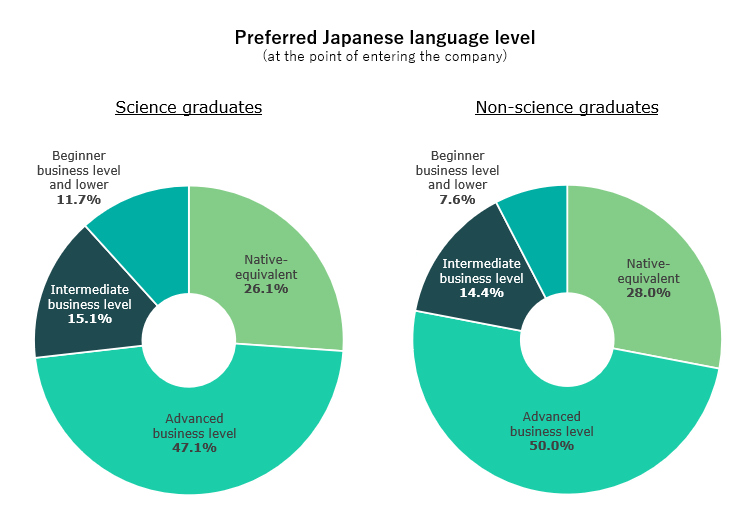Non-teaching jobs in Japan for foreigners

by Florian
A lot of foreigners in Japan start out as English teachers. But many other types of jobs are available – even for newcomers to the respective industries. This article lists some of the options.
コンテンツ
Jobs for foreigners outside of English teaching
English teaching jobs are popular with foreigners because they’re an easy ticket to a life in Japan. But they’re not for everyone, and some people eventually want to switch to another career. Luckily, in tandem with Japan’s population decline, the country is also internationalizing. Nowadays, finding a job as a foreigner in Japan is easier than even – yes, even outside of English teaching.
But to get jobs in a specific field, you need years of experience – right? Not necessarily. Many companies in Japan are open to taking in people with no experience as long as they show a strong motivation to learn and seem like a good (long-term) fit for the company.
Entry-level positions are usually intended for fresh university graduates. But in many cases, people that have already left university and worked somewhere for a few years are welcome as well. The main limiting factor is age. The standard university graduation age in Japan is 22. Getting entry-level jobs becomes harder as you enter your late 20s (and even harder after crossing 30).
Below, you can see some non-English teaching job options. For each section, we’ve added some Japanese keywords. When searching in Japanese, combine them with 求人 to see job ad results. Other modifiers are 未経験歓迎 / 未経験可 (for entry-level jobs/jobs that require no experience) and 外国人 / 外国人歓迎 / 国籍不問 (for jobs that are explicitly open to foreigners).
IT Engineering
Japan is facing a serious labor shortage, and the lack of talent is especially notable in the engineering professions. From the outside, Japan is often seen as a high-tech country. But at a closer look, legacy systems and old technologies are everywhere, hampering the country’s competitiveness. IT is often looked upon as maybe the one sector that can pull Japan out of this problem.
Because of strong international competition, IT companies are relatively open to hiring foreigners. Of course, the ideal candidate would come with a background in Computer Science and a few years of experience. But amid limited options, Japanese IT companies are also willing to hire newcomers and self-taught candidates with strong work ethic.
Japanese keywords for this job type:
ITエンジニア – IT engineer
プログラマー – programmer
システムエンジニア (SE) – system engineer
ソフトウェアエンジニア – software engineer
ソフトウェア開発 – software development
ネットワークエンジニア – network engineer
Webエンジニア – web engineer
フロントエンドエンジニア – front end engineer
サーバーエンジニア – server engineer
International Consulting/Training
Japan has a unique culture that requires foreign companies to adapt their strategies to effectively take hold in the market, make smart decisions, and sell products. Consultants help with avoiding culture- and communication-based problems that lead to stunted growth or even business failure.
It’s not only foreign companies that need guidance on how to deal with the Japanese, though. Japanese companies also need to learn how to work with foreigners. Japan is internationalizing, and companies have to take steps to thrive in this changing environment. If you want to “bridge the gap” between Japan and the outside world, consulting or training is a good choice.
Japanese keywords for this job type:
国際コンサルタント – international consultant
国際カウンセラー – international counselor
国際業務スタッフ – international affairs staff
異文化コンサルタント – foreign culture consultant
海外事業コンサルティング – overseas business consulting
海外進出コンサルティング – overseas expansion consulting
Export/Import and Logistics
In the past, Japan used to heavily rely on domestic demand (内需, ないじゅ) but this era is long gone. Now, like other developed nations, Japan relies on a complex system of international logistics and trading. Supply chains have to be established, maintained, and managed. For all these things to work, internationally-minded communicators and organizers are invaluable.
This is one of the job types where you can put your non-Japanese, non-English skills to use. To find these jobs, research companies that have strong ties to your home country. The chamber of commerce of your country could be a good place to start.
Japanese keywords for this job type:
国際貿易 – international trade
海外貿易事務 – overseas trade (office) work
国際物流 – international logistics
国際輸送 – international transportation
輸出入業務 – import/export work
Headhunting
With the country’s population decreasing, many Japanese companies are struggling to find the right people for their open positions. Headhunters help them find talent that matches their requirements. Companies pay them huge sums for successful placements, often more than an entire year’s salary.
Headhunting is very competitive – it’s a “sink or swim” industry. Find the right candidates that lead to contracts and receive very good pay … or don’t and be left behind. Not everyone is equipped to deal with this kind of pressure. But if you’re ambitious, communicative and like working with people, this job type could be for you.
Japanese keywords for this job type:
人材紹介 – HR staffing
人材営業 – HR sales
人材コンサルタント – HR consultant
人材コーディネーター – HR coordinator
人材カウンセラー – HR counselor
ヘッドハンター – headhunter
Translation and Interpreting
This type of job has probably at least crossed the mind of everyone who’s been studying Japanese seriously. For many, the first thing they think of is anime/manga or video game localization, but there are many more opportunities. Japan’s insular nature, coupled with its strong economy, creates a need for translators in all sorts of fields: medical, IT, automotive, fashion…
The good thing about translation and interpreting is that it’s open for everyone. There’s no need for a specific degree or educational background. However, companies often ask for (professional) translation experience, so finding your way in can be tricky.
Japanese keywords for this job type:
翻訳・通訳 – translation/interpreting
翻訳通訳事務 – translation and interpreting (office) work
ローカライズ – localization
翻訳スペシャリスト – translation specialist
トランスレーター – translator
Tourism and Hospitality
Japan is a popular tourist destination. Until the worldwide spread of the Coronavirus pandemic, numbers of foreign tourists were reaching new record highs every year. The current situation has put a serious damper on things. But as soon as things start shifting back to their pre-pandemic status, demand is bound to increase again.
Typical jobs falling under the regular working visa category (Engineer/Specialist in Humanities/International Services visa) mostly cover PR, marketing or management-type tasks for travel agencies, hotels or hotel chains, and booking companies.
Because of their “unskilled” nature, jobs that don’t require a university degree – e.g. reception work, room service, room cleaning etc. used to be not easily accessible to foreigners. Since 2019, however, these types of jobs are accessible through the Specified Skilled Worker Visa.
Japanese keywords for this job type:
観光企画スタッフ – tourism planning staff
観光企画経営 – tourism planning and management
観光 マーケティング – tourism marketing
ホテルコンシェルジュ – hotel concierge
ホテルスタッフ – hotel staff
旅館スタッフ – ryokan staff
フロントスタッフ – front desk staff
Japanese skill requirements
Now that you’ve seen different job options, I bet your next question is: “Do I need Japanese for these?” The answer is simple: In most cases, yes.
You can sometimes find jobs that require minimum Japanese (or even none at all) in software development and other technical fields that require a high degree of specialization as well as hihg-level management. For everything else, though, you’ll need at least some Japanese (even at multinational corporations).
In December 2020, the Human Resources company DISCO collected answers from around 500 companies regarding their preferred Japanese language level when hiring international students. Roughly 75% of companies answered that they were looking for people at “advanced business level” and higher. Now, these are the numbers for fresh graduates with no work experience. Still, looking at these numbers, JLPT N2 level is just about the minimum.
When job-hunting as a foreigner in Japan, your Japanese skills and other technical skills balance each other out. In other words: Better Japanese skills can make up for a lack of “proper” hard skills, and higher technical skills can land you jobs that require less Japanese.
When you already have a job, finding time to level up your Japanese all on your own can be hard. For the quickest results, a private tutor or one-to-one lessons are the best choices. Among the many Japanese language schools in Tokyo, some focus exclusively on business Japanese education. Linguage Japanese Language School in Shinjuku is one of them. Check out their private lesson plan by clicking the button below!
Sources for job and industry information
Job boards
The first option that you’ve probably already thought of are your trusty online job boards. The English-language boards offer you a decent amount of options. English-only or English-Japanese hybrid postings are common. But there are also quite a few postings written purely in Japanese
A Japanese language-only job ad doesn’t mean the job is only open for Japanese people. Some companies only put up Japanese ads on purpose to filter out applicants that don’t match the language level they’re searching for.
English-language (or English/Japanese hybrid) job boards:
– Gaijinpot Jobs
– Daijob
– Jobs in Japan
– Glassdoor
– LinkedIn
Japanese-language job boards:
– Indeed
– Doda
– Rikunabi Next
– Kyujin Box
– Stanby
Events, seminars and networks
In addition to job boards and other kinds of online research, you can widen your horizon by attending events or seminars. This can be especially helpful when you’re not yet sure what exactly you want to do. A lot of industry-specific and more general business events are also open to interested “outsiders” or newcomers. Attending these events can give you a general feel for what other people are doing, what the industry your aiming for is like, and what kind of jobs there are. They’re also a chance to establish some connections for your personal network.
Sites where you can find events:
– Meetup (Career & Business Category)
– Doorkeeper
– LinkedIn
– 10times
English networking groups:
– Business in Japan
– InterNations
– The Tokyo Business Meetup
– Tokyo Expats
– Tokyo Professionals
Conclusion
Japan is internationalizing and diversifying, which means a greater variety of jobs available to foreigners. That being said, just being a foreigner is not enough. Outside of English teaching, jobs where being a native or fluent speaker of English is all it takes to get hired are few and far between. You need additional skills or a very good network.
If you’re already in Japan and are thinking about a job change, it’s probably best to focus on your Japanese skills first. Being able to speak Japanese fluently (with JLPT N2 or N1) is going to open up opportunities that you wouldn’t even be able to perceive otherwise.
On top of Japanese competency, think of one other strength or skill that you want to bring to the table. It can be coding, extensive knowledge of Japanese business culture, or something else. At entry-level, nobody is expecting you to be a prodigy, but studying up on your own is still important. From a Japanese company’s perspective, solid foundations and a strong will to improve are essential.
Recommended Posts

The 10 Most Popular Japanese Companies in 2021
19 5月 2021 - Work



